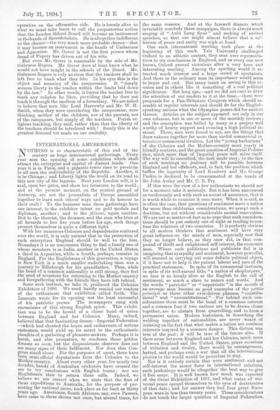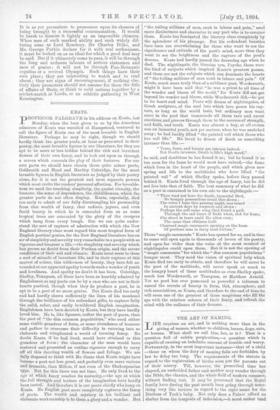INTERNATIONAL AMUSEMENTS. N OTHING is so characteristic of this end of
the century as huge international gatherings. Every year sees the opening of some exhibition which shall attract the enterprise and capital of distant lands. One year it is in Paris, and a gigantic tower rises to proclaim to all men the indivisibility of the Republic. Another, it is in Chicago ; and Liberty lights the world on its road to this new city of the lagoons. Next year London will, it is said, open her gates, and show her treasures to the world ; and at the present moment, on the neutral ground of Antwerp, are not the journalists of Europe assembled together to learn each others' ways and to do honour to their craft P To the business man these gatherings have one interest, to the exhibitor intent on gold medals and diplomas, another ; and to the ficineur, again another. But to the theorist, the dreamer, and the man who tries at all hazards to live five years before his age, such things present themselves in quite a different light. With her numerous Colonies and dependencies scattered over the world, it is only natural that in the promotion of such enterprises England should be well to the fore. Nowadays it is no uncommon thing to find a family one of whose members is in India, another in the United States, a third in Argentina, while a fourth, perhaps, remains in England. For the Englishman of this generation, a voyage to New York is a much smaller undertaking than was a journey to Edinburgh for his grandfather. Thus, while the bond of a common nationality is still strong, they feel the need of occasions for returning to the Mother-country and foregathering with the friends they have left behind. Some such instinct, we take it, produced the Colonies Exhibition of 1886. We need hardly remind our readers of the enthusiasm that exhibition called forth. The Laureate wrote for its opening not the least successful of his patriotic poems. The newspapers rang with encomiums of this strong English spirit. This exhibi- tion was to be the herald of a closer bond of union between England and her Colonies. Many, indeed, believed that that fascinating dream—Imperial Federation —which had cheated the hopes and endeavours of serious statesmen, would yield up its secret to the enthusiastic plaudits of a gathering of pleasure-seekers. Perhaps it is harsh, and also premature, to condemn these golden dreams so soon, but the dispassionate observer does not see many signs of their fulfilment. Nor does this Con- gress stand alone. For the purposes of sport, there have been semi-official deputations from the Colonies to the 1VIother-country. About every other year, for nearly two decades, bands of Australian cricketers have crossed the sea to try conclusions with English teams; are Englishmen Blow to return these calls. ndeed, we believe we are correct when we state that the first of these expeditions to Australia, for the purpose of pro- moting the national game, took place as far back as thirty years ago. Americans, South Africans, nay, even Parsees, have come to these shores not once, but several times, for the same reasons. And at the farewell dinners which invariably conclude these campaigns, there is always much singing of " Auld Lang Syne " and making of excited speeches, so that one might almost believe that a mi'- lenium of peace and amity was nigh at hand. One such international meeting took place at the beginning of this week. Yale University challenged Oxford to an athletic contest, they sent over representa- tives to try conclusions in England, and as every one now knows, Oxford proved victorious after a very keen and interesting meeting. Among the sporting world it at- tracted much interest and a large crowd of spectators. And there to the ordinary man its importance would seem to begin and end. But many insist on seeing in this re- union and in others like it something of a real political significance. Not long ago,—and we did not omit to draw the attention of our readers to it at the time,—there were proposals for a Pan-Britannic Congress which should as- semble at regular intervals and should do for the English- speaking nations what the Olympian games did for ancient Greece. Articles on the subject appeared not only in our own columns, but in one or more of the monthly reviews ; and the conception was hailed by many as a project well worthy of hearty support and evincing a high political in- stinct. These, men were found to say, are the things that draw nations together far more than sordid. commercial in terests or commercial rivalries. Let the "young barbarians" of the Colonies and the Mother-country meet yearly in friendly contests, and the great question of Imperial Federa- tion, much more that of Imperial peace will solve itself. The way will be smoothed, the task made easy ; in the face of such meetings no jealousy will be possible between England and her offshoots, and, in fact, the problem which baffles the ingenuity of Lord Rosebery and Mr. Georg Parkin is destined to be consummated at the hands of Sir John Astley and Mr. C. B. Fry.
If this were the view of a few enthusiasts we should not for a moment take it seriously. But it has been announced so vociferously and with such an accent of assurance, that it is worth while to examine it once more. When it is said, as is often the case, that questions of sentiment move a nation far more than utilitarian considerations, we accept such a doctrine, but not without considerable mental reservation. We are not so matter-of-fact as to urge that such considera- tions should be put entirely out of sight as tending to con- fuse the relations of two countries. It is perfectly obvious to all modern thinkers that sentiment will have very great influence on the minds of men, especially now that they no longer believe, as they once did, in that com- pound of thrift and enlightened self-interest, the economic man. Where such politicians and publicists fail is in. imagining that sympathy and sentiment, however powerful, will succeed in carrying out some definite political object, if it have not to help it the patient labour and care of the practical statesman. In spite of its commercial instincts, in spite of its well-earned title, "a nation of shopkeepers," no race is so keenly alive as the English to the call of sentiment, so much a slave to names and words. And the words " patriotic " or " unpatriotic" in the mouth of an average man become as good. examples of the petitio principii as those other over-driven phrases, " constitu- tional " and " unconstitutional." For behind such con- siderations there must be the bond of a common interest and a common fear if two nations are to be drawn closer together, are to abstain from quarrelling, and to form a permanent union. Modern historians, in describing the welding together of nationalities, are never weary of insisting on the fact that what makes a nation are common interests inspired by a common danger. This dictum was true of the past ; it will be true of the future also. If there arose between England. and her Colonies, much more between England. and the United States, grave occasions of irritation and rivalry, there would be estrangement, international picnics and perhaps even a war that all the nternational picnics in the world would be powerless to stay. Nor is it entirely certain that were sentiment and not self-interest the motor force in international relations, such junketings would be altogether the best way to give it free scope. It is well known how much was expected. of the Great Exhibition of 1853, and what vistas of uni- versal peace opened themselves to the eyes of doctrinaires of that date; and for answer they had four great Euro- pean wars in less than twenty years. These considerations do not touch the larger question of Imperial Federation.
It is as yet premature to pronounce upon its chances of being brought to a successful consummation. It would be harsh to dismiss it lightly as an impossible chimera. When men of such marked ability and such widely dif- fering aims as Lord Rosebery, Sir Charles DiIke, and Mr. George Parkin declare for it with real enthusiasm, it must be looked on as an ideal for which a good deal may bo said. But if it ultimately come to pass, it will be through the long and arduous labours of serious statesmen and men of genius ; it will not be through Pan-Britannic regattas or a revived Olympia. Such things have their own place ; they are interesting to watch and to read about ; they are signs of encouragement, if nothing else. Only their promoters should not assume for them the title of affairs of State, or think to weld nations together by a cricket-match at Lords, or an athletic gathering in West Kensington.


































 Previous page
Previous page